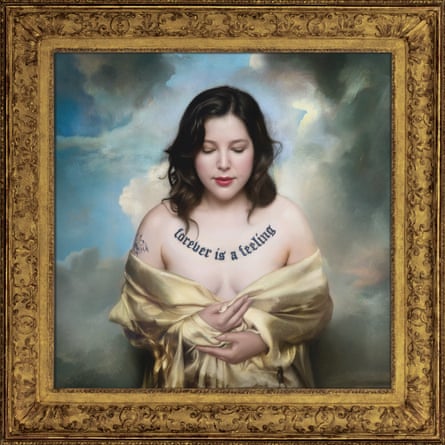In the shadow of a Hogarth painting, accompanied by guitar and violin, Lucy Dacus is singing about disappointment. The painting depicts Thomas Coram, founder of the Foundling Hospital in London’s Bloomsbury district. A shipbuilder by trade, he is portrayed in full baroque garb, a style usually reserved for the aristocracy. But amid the classical architecture and rich fabrics, he is shown as he was: the thread veins on his face, his feet not quite touching the ground. The setting is apt for Dacus’s disquisitions on life and love, and the ways they can exceed, or fall short of, the expectations we place upon them: the moments that feel exalted, idealised, as well as the times when reality intrudes on the fantasy.
The Foundling Museum, the setting of tonight’s intimate show, also holds a deeper meaning for the singer-songwriter, who was raised in Mechanicsville, Virginia by adoptive parents; the mother who raised her was herself adopted from an orphanage at a young age. “I had nothing like this growing up,” says Dacus to the assembled crowd. “We don’t have the concept of a foundling in the US. It would have been cool if the other kids at school had known that was fine.” The previous day, after her photoshoot in the museum’s grand-looking court room, she is visibly moved upon learning about the building’s history, and its current work training care-experienced young people. She asks the organisers about inviting some of the trainees to the concert: it would, she says, be a way of showing them “hey, I’m doing cool shit – you can do cool shit.”
The cool shit in question is the kind of life most teenagers dream of. Signed to Matador in 2016, aged 21, Dacus has been crafting sumptuous, emotionally astute music straddling folk and indie rock since the release of her debut, No Burden. Two critically acclaimed albums followed, producing singles such as immaculate breakup anthem Night Shift and the yearning, Springsteen-esque Hot & Heavy. A through-line of her discography is the arresting interplay between her agile, velvety voice and often unsettling lyrics: on the quietly devastating Thumbs, inspired by the time she accompanied a friend to meet her estranged, abusive father, Dacus imagines placing her thumbs on the man’s eyes, “pressing in until they burst”.

In 2018, she joined forces with Californian Phoebe Bridgers and Tennessee-born Julien Baker, two songwriters who share her enthusiasm for 90s alternative music, ethereal harmonies and dry internet humour, to form supergroup Boygenius. After a self-titled EP, their chart-topping 2023 debut The Record was nominated for seven Grammys, winning three of them; the group made history as the first all-female band to win best rock song and best rock performance. The group also won a Brit, and the band’s first UK gig, a sold-out 25,000-capacity show at London’s Gunnersbury Park, has also been their biggest to date. They replicated Nirvana’s historic 1994 cover shoot for a Rolling Stone interview, in which the magazine called them “the world’s most exciting indie band”. They are currently on hiatus. “The goal is not a repeat of that experience,” says Dacus, sipping green tea in a room downstairs, under a different Hogarth painting. “The reception to The Record outpaced what any of us expected. Then the time since then – thank God we’ve stopped. It’s nice to chill a little bit.” A later question about the band is met with: “Let’s skip it. Because it’s not about them.”
Dacus’s focus today is firmly on her accomplished new solo album, Forever Is a Feeling, an intensely personal record that should crystallise her reputation as an important artist in her own right. In the run-up to its release, Dacus has deliberately scaled things down, playing a selection of tiny gigs in boutique, atmospheric venues: the neo-gothic Vondelkerk in Amsterdam; a candle-lit show at the Église Saint-Eustache in Paris, where she dedicated a song to her girlfriend (“I wonder if that has never been done in this building,” she mused, eliciting cheers). For the first time, she has had the money and resources to invest in an elaborate aesthetic for the album, which centres largely around classical art. The cover is a Renaissance-style oil painting of Dacus by artist Will St John; in the video for lead single Ankles, she is a portrait who has come to life and escaped from her frame, wandering around Paris in a custom-made Rodarte gown.
The portrait imagery reminded many of Céline Sciamma’s film about forbidden love, Portrait of a Lady on Fire, but it may also be a reference to a key part of Boygenius lore: the time that Baker found Dacus reading Henry James’s The Portrait of a Lady backstage at a show they played together in 2016. Fans have fervently speculated about Dacus and Baker’s relationship, which, while not exactly kept secret, has until now never been confirmed or denied. Several lyrics on Forever Is a Feeling corroborate what many had long suspected: “You knew when you caught me reading at your show”, goes Big Deal; elsewhere, the “most wanted man in West Tennessee” nods to Baker’s hometown of Memphis.
We meet on the day the news goes public, in the narrow window between the publication of a New Yorker profile, in which Dacus confirmed she and Baker are “in a committed relationship”, and the story being picked up by gossip sites and social media. Before long, memes had been spawned, as well as a portmanteau (“Jucy”). Was it a difficult decision to write about her personal life on the album, knowing how invested many people would feel? “It wasn’t a choice to write the songs – that’s just what I have to give, though I guess it’s a choice to share them,” she says. “There’s this vague uneasiness to opening up that much. I can never tell why it feels scary, because ultimately, I feel secure in my relationships … I don’t love being perceived.” She looks down, slightly shrinking in on herself. “I hope the record speaks for itself, and that people will find it. That will matter more than anything I can say.”
Fans excited by the announcement might be alarmed by some of the lyrics. There is good sex in hotels and wrists in zip ties, but also minor betrayals and possibly bigger ones; faces are contorted in anger before tender gestures are exchanged. Both parties make mistakes: “I’m not sorry, not certain, not perfect, not good,” sings Dacus on Lost Time. The excellent, spiky single Talk is about a relationship that may or may not be in its death throes: “We run out of conversation / Day runs out of light”. Written and recorded between 2022 and 2024, the songs show relationships at various stages, encompassing the rush of first love as well as the meaner, darker moments not usually aired in public. “I was just feeling all aspects of falling in love and falling out of love and moving and missing people and revelling and finally admitting the truth. It’s all very big things.”
The central thesis of the album is that, even if a relationship does not last forever, the feelings experienced in the moment are of immense value. “I love your body / I love your mind / They will change / So will mine,” Dacus sings on Best Guess, acknowledging that the future is unknown; throughout, the lyrics reconfigure the conventional wisdom of “till death do us part” into something more modern and realistic, based on choice rather than obligation. “Life is non-consensual,” she says. “You get brought into this world. You did not ask to be. You learn whatever language you’re hearing, you usually take on the religion you’re raised in. That’s part of why I think love is so powerful later in life, because you basically get to bind by choice with people; you share enough experience that there’s a bedrock that makes it enjoyable or rich. Love with a partner – that’s like saying, we are family now, and I choose these obligations to you, and I happily take on whatever that requires of me.”
This concept also extends to her family arrangements. Growing up, her schoolmates’ reference points for adoption were tales of tragic orphans, like Oliver Twist or Annie, but she never saw it that way. “I felt very special, because the emphasis was not on the fact somebody didn’t want me, it was that somebody was honest that they couldn’t take care of me.” After meeting her birth parents aged 19, she is now good friends with her birth mother; they recently went to a Heart concert in LA together. She is close to her adoptive parents, a pianist and music teacher and a graphic designer. “You can build a family by choice and not just blood. Societally, maybe people look down on it, but I am my parents’ child – the parents who raised me. We are family, and there’s no second best or diminutive follow-up to that. It’s just a good thing. I wish more people considered it an option for their lives.”
In person, Dacus emanates a sense of calm that belies the analytical self-excoriation in her songs. Emotions and relationships are discussed with reverence, but a sharp sense of humour often lurks beneath the surface (when I ask what body part she’ll write a song about next, after Thumbs and Ankles, she deadpans: “Head”). The care that has gone into every aspect of the album is apparent in the way she talks about it. There is a new intricacy to the arrangements, greater introspection in the lyrics; from the cover art to the cinematic music videos, there is an increased emphasis on artistry and detail. “I’m a bit burnt out on all the digital art that is happening,” she says. “I wanted to work with people who have high skill levels and craftsmanship. It’s connected me back to why people make art in the first place.”
She is frustrated by mounting pressure to incorporate AI elements into creative processes. “I don’t care, basically, whether AI would or wouldn’t create good art,” she says with an exasperated eye-roll. “The environmental impact alone should be enough to have people stop. And also – you want a shortcut to art? You want to have made a product, you don’t want the internal process. That’s the entire reason for me. I would never be able to sing a song that a robot wrote. It breaks my heart that some people would forgo the chance to actually get to know what they have to say.”
On the album, she sings about feeling alienated by the music industry: “I was in a boardroom / Full of old men guessing what the kids are getting into… I don’t belong here, nobody does” (Come Out). She recalls being in rooms with people who have no interest in her music, but view her as a potential paycheque: “Sometimes people are upfront about their want to make money off of you. Some people try to disguise it.” Putting out music now, compared with when she started, “is a lot less fun. And I love fun – I take fun seriously. Life should be bringing you joy.” The heightened cynicism and negativity on the internet can sometimes take its toll. Although her fans are generally “really sweet”, the increased visibility brought by Boygenius has made her a bit more guarded. “Other people do expect performance from you. It doesn’t feel good sometimes if you’re having a personal moment, and people basically make it a professional moment by wanting to film you.”

Last year, her friend Chappell Roan spoke out about fans’ intrusive behaviour. Has it made a difference? “One hundred per cent. We were in New York one time, and that was the least I’ve ever been talked to in New York – it was with her. So I think people are really listening.” Dacus believes we should start to think about fandom in a new way. “I have abstract care for the fans, and I genuinely feel that they care about me, even though we don’t know each other at all. That doesn’t even mean we know how to have a conversation when we’re together, but still, there’s something sweet there. Most people have good intentions.”
Many of Dacus’s values, she says, stem from her upbringing in the church. “There was a huge emphasis on service: painting fences, babysitting, making food for people. There’s a lot about growing up in the church that made it hard to get to know myself, but that was a really good part of it.” These days, though she no longer considers herself religious, she still has “a lot of reverence and curiosity”. One lesson Christianity taught her is the importance of not giving in to hatred, something that can feel increasingly difficult. “I do think it’s important to try for love. Maybe a useful distinction is hate versus anger. I’m extremely angry and frustrated and disgusted, with lots of people in power and bigots in general. But hate to me feels like it’d be more of the same if I just hated them back.” (When I ask about the 1975 singer Matty Healy, whom she had a public falling out with after he tweeted an offensive joke about her band’s name, she says simply, “We’re not in touch.”)
One of the topics Dacus has been vocal about is the situation in Gaza: Boygenius wore Artists4Ceasefire badges to the 2024 Grammys and have attended pro-Palestine rallies, which has led to some backlash. “Sure, but it doesn’t matter. There are some opportunities that I’ve lost, but the idea that I would take them anyway… I don’t want them. You have to look back on your life one day and try to be proud of yourself.” Two days after Trump’s inauguration, she announced she would be giving away $10,000 for trans people’s surgery costs. “I currently have friends whose passports are being ‘corrected’, and people whose IDs are being held so they can’t get out of the country. I fear for the physical safety of the trans people in my life, particularly non-white trans people – I fear for immigrants getting deported. It’s just so heartless. What are you trying to defend? What is this country you speak of?”
At the start of May, Dacus will turn 30 – a decade she’s looking forward to, whatever it holds. If her 20-year-old self could see her life now, she says, she’d be “really weirded out. If I was given the choice, I would have to really think about it.” If she could give herself a piece of advice at that age, it would be: “Don’t be so loyal that you bring assholes along for the ride. Get real about people who don’t treat you well enough.” Her main ambition for the future is to keep doing things she is proud of, not necessarily in music but “other fields and art forms, including farming and cooking”. She hopes to spend more time in LA, where she moved in 2023, despite the “apocalyptic” fires earlier this year. “I want to plant a seed and then see it become something. I want my life to be still enough and reliable enough that I can do that.”
Later this summer, she’ll be playing Glastonbury, another experience to add to her “cool shit” portfolio. “That, I guess, is a bucket-list thing. I hear it’s kind of a dirty experience: a muddy, weird time. I’m sure I’ll be dripping sweat and it’ll be a riot.”
-
Forever Is a Feeling is out now via Interscope. Lucy Dacus tours the UK in June and July
Source: theguardian.com





















